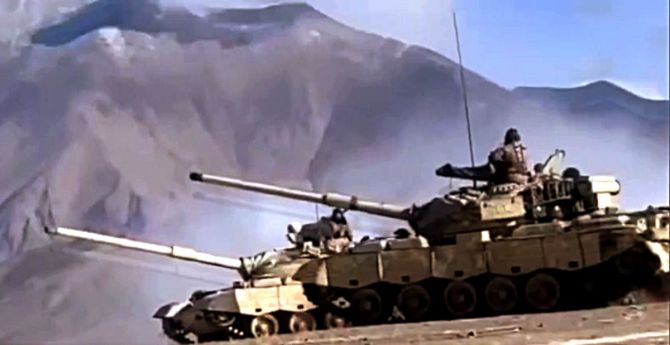'The immediate attempt by China is to get its way and gain territory through small steps without having a full-scale war.'

"There can be little doubt that India did not have intelligence about China's plans and moves before May 2020."
"We did not predict what they did. We did not anticipate it. To that extent we were taken aback. Thereafter, our armed forces have responded superbly," says Ambassador Gautam Bambawale, India's former ambassador to China, Pakistan and Bhutan in the concluding part of his eloquent interview to Rediff.com's Archana Masih.
During your tenure in Beijing did you ever get the impression that Xi Jinping and his darbar wanted to play hardball in India?
Or do you think something changed in the India-China relationship in recent times to force this standoff that we have seen in Ladakh since May 2020?
Addressing the boundary issue with India through military might was always an option on the table.
What has really made this option something that could be utilised in practice, is the vast asymmetry in economic, military and comprehensive power which has opened up between India and China over the past 15 years.
This gap in capabilities was a necessary condition for China to attempt to use force on our borders.
This huge gap in power and capabilities is what India needs to address if we are to protect our territorial integrity.
We must focus on high paced economic development and regain the 8 per cent per annum GDP growth trajectory.
The way to achieve this target is to ensure that the people of India -- our real and tangible asset -- are given an economic structure in which they can exhibit their creativity, their drive, their innovativeness.
We have to reduce the role of government in economic activity and ensure that rule of law enables private enterprise to flourish.
This kind of root and branch economic reform is the need of the hour for India, not tinkering on the margins.
What is the endgame for Xi Jinping? Is it to bolster his own position going into 2022?
Have you been able to decipher the Chinese thinking that has gone into this year-long standoff in Ladakah?
Could a war -- whatever the duration -- be the eventual outcome?
Or will Xi Jinping have retracted from the possibility given the Indian Army's determined and unwavering response?
The immediate attempt by China is to get its way and gain territory through small steps without having a full-scale war.
This is what they have done successfully in the South China Sea and this is their hope in Ladakh and perhaps other parts of the India-China boundary.
This is not merely a military affair. It is a long term, strategic tussle for hegemony in Asia and beyond.
India has not merely to stand its ground militarily, it will have to enhance its national power over the next 15-20 years.
Which means we have to focus on economic reform and rejuvenation.
In the shorter term, we will have to build balancing coalitions like the Quad to ensure our integrity and freedom.
This is going to be a challenge for Indian diplomacy because we will have to build deep partnerships with other democracies including in our own neighbourhood.
Such partnerships will involve give and take, including on domestic matters, which Indian diplomacy is not comfortable with.
One columnist held out the theory that the Chinese may open a fresh frontier before the 2024 election in Uttarkhand, near the Char Dhams? Do you think it is possible?
You have outlined the contours of how to achieve better India-China relationship. Does that now seem impossible now that India-China exist in disharmony?
Look, it is China which has decided what kind of relationship it will have with India by taking the military route in 2020.
It is now obvious that relations will deteriorate. They are already in bad shape.
It is not a question of what India can do to improve them. China, by its actions in eastern Ladakh, is saying that relations will improve only if India kowtows to China. India must accept China as the hegemon in the region and accept a place of inferiority. You want to do that? Or do you want to fight back? This is a real test of Indian character.

Was the GoI taken aback at the start of the Ladakh standoff and reluctant to explain the exact situation? How do you explain the hesitancy?
Was it a sense of shock at the Chinese betrayal and a belief that diplomacy would resolve the standoff?
Yes, there can be little doubt that India did not have intelligence about China's plans and moves before May 2020.
We did not predict what they did. We did not anticipate it. To that extent we were taken aback. Thereafter, our armed forces have responded superbly.
Would you say diplomacy failed? And it was only the Indian Army's doggedness especially in taking position on the Kailash Heights that forced the Chinese to talk?
Do you think that we missed the opportunity to extract more Chinese withdrawal in Depsang, for instance, by withdrawing from the Kailash Heights?
China decided to move militarily in eastern Ladakh. The immediate response had to be in military terms too. Now, over time, we can and have responded in geo-political as well as economic terms. This is only correct. China decided not to give diplomacy a chance. Our responses will have to be in accordance with China's moves.
I would also say that with the new situation on our border, India too should weigh its own options on how to move further.
We should set the terms of interaction and not merely respond to China's actions.
Generals I have spoken to have emphasised that the Chinese are not to be trusted and we must always be vigilant. Would you agree? What is your reading of the Xi Jinping disposition?
In relations between two sovereign States which are ancient civilisations, there is no question of one trusting the other. We have to be prepared for all eventualities.
The gaping asymmetry between India and China has been staring us in the face for some years now. We have paid little attention to it.
India must regain high paced economic growth of 8-9 per cent per annum. We have to enhance our comprehensive national power.
We have paid insufficient attention to India's economic growth trajectory. While we have to do this for ourselves - to improve the living standards of our people, now there is another more urgent reason to do so.
That reason is -- the Chinese dragon has the Indian tiger by the tail.
Feature Presentation: Aslam Hunani/Rediff.com











 © 2025
© 2025